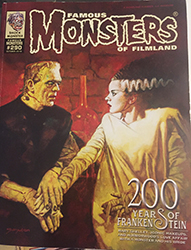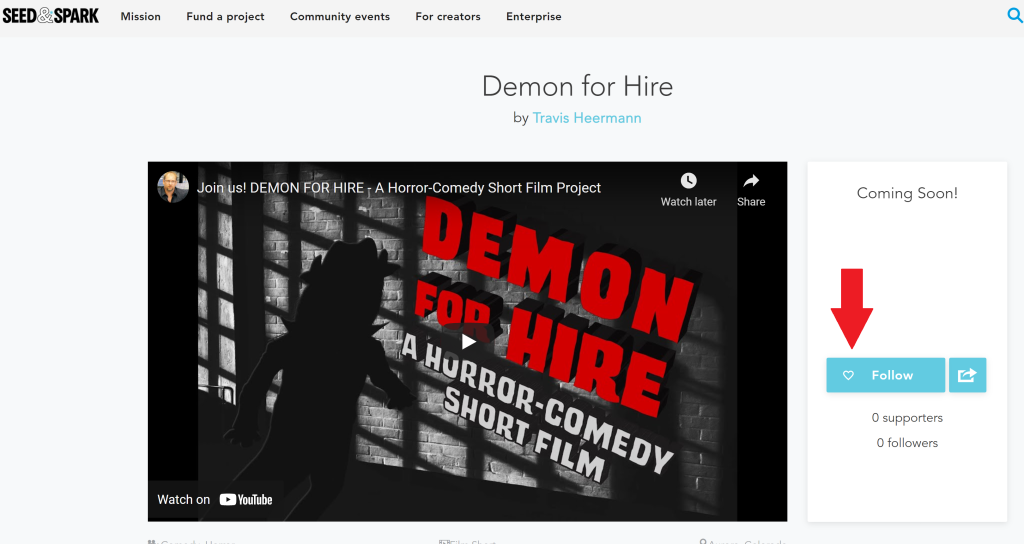At about the time when I started writing my first novel at age twelve (a 250-page single-spaced Barsoom-esque epic), I was also dreaming of making my own movies. My mom found an old, silent 8mm movie camera at a garage sale, so we took to making home movies. It came with a bank of blinding floodlights that were necessary for indoor shots, so whenever we used it indoors, everyone was constantly shielding their eyes. But I dreamed of making movies with it. I tried to do some stop-motion a couple of times, but it just didn’t have that capability. And in the middle of nowhere Nebraska where I grew up, there was no such thing as film school.
I loved movies so much, but it was like their creators existed in an entirely different realm, one I could never reach myself. And then I went to college, got in a relationship, and life took over.
I’ve always had a storytelling instinct. Writing is a big part of that, but over the course of my life, GMing roleplaying games for years also scratched that itch. Even tabletop wargaming filled that space for me, because battles were a story, especially if I had spent many, many hours hand-painting my own armies. The writing was always important, but often it took a back seat to a weekend’s Call of Cthulhu or Vampire: the Masquerade session.
It was in my late 30s, when I was in grad school, having just spent three amazing years in Japan , that a close friend gave me a copy of The Artist’s Way, and we decided to do it together. For the unfamiliar, The Artist’s Way is basically a twelve-step program for re-awakening and re-connecting with our innate creative drives. I strongly recommend it for anyone who loves walking a path through the arts, no matter what media. During one of the exercises, I was asked to think about what kinds of things I would be creating if there were no limits on time, opportunity, money, any of the myriad of things or circumstances that hold us back.
For me, one of those things was screenwriting. I pondered this for a while. My first script was one I was actually paid to write as a freelance project. It was a fun little sci-fi feature, and I discovered quickly that I loved the format of a screenplay, and I loved the idea that I was actually writing something that could become a movie. As far as I know, it never went anywhere, but it was a great learning experience.
I ran into my buddy jim pinto (who hates capital letters) at GenCon and we cooked up the idea to write a screenplay together. So working virtually we cooked up a romantic-dramedy that formed another great learning experience.
There were several things I didn’t realize at first about how this works.
First and foremost, it’s all about belief. Belief in oneself, first and foremost, belief that it can happen.
The same can be said of writing fiction. Part of a fiction career is building up your skills, but it’s also about believing you can make it, believing that your skills are there, that you have stories other people should read. So you send that query. You publish that first book. You submit that short story to your dream publication. And you cultivate insane levels of perseverance.
The walls to enter the film and TV industry are even taller than in publishing, and the gatekeepers are far more brutal and careless. In the publishing industry, you can get an actual rejection. In film and TV, all you get is…crickets. And disingenuous crickets at that.
Gatekeeper: “Wow! That story sounds amazing!”
Me: “Can I send it to you?”
{chirp…chirp…chirp}
It was jim and I’s next script, a Lovecraftian horror-western, Death Wind, that flung wide the doors of belief for me. It won the Grand Prize in the screenwriting contest at the Cinequest Film Festival, an award that came with some actual cash, and told us we had a story with some legs. No one picked up our script, but we subsequently adapted it into a novel I’m really proud of.
But then my screenwriting dreams went fallow for a while, it seems. It was 2017 before I threw myself into it hard again, adapting my novella Where the Devil Resides to script and submitting it festival contests. Its first reward was a trophy plaque and my name in Famous Monsters magazine (which felt like a huge milestone for my little monster-lovin’ heart), and an amazing weekend at the Silver Scream Horror Film Festival, where I got to meet and hang out with John Russo, who wrote Night of the Living Dead, share birthday cake with Ricou Browning, the Creature from Black Lagoon, who had just turned 89, and have a wonderful hang-out with Barbara Crampton, scream queen star from Re-Animator and From Beyond.

If my 17-year-old self watching those movies would have known I’d someday hang out with the lead actress and she’d be really gracious to me, I might have keeled over and died.
Since then, I’ve been to some great film festivals. Shriekfest, Crimson Screen Horror Festival, Genre Blast. Just this month, the Where the Devil Resides script is a finalist at the Filmquest 2021 Film Festival.
Through submitting my scripts to those festivals and scoring some more wins and finalist placement, my belief that I CAN DO THIS has solidified incrementally. Not unlike a fiction writing career as one builds recognition and publication history.
And the single most fun, most important aspect of going to those festivals, like for writers going to conferences, is meeting other filmmakers. They’re a slightly different breed than fiction authors, more outgoing, but passionate from head to toe. I’m really fortunate to have been accepted into that circle of wildly creative people.
Through those levels of acquaintance, acceptance, and mutual geekery around genre films, hanging out with other filmmakers, I realized I now know people with whom I could make my own movie.
It was like a long-buried fossil idea emerging from desert sands.
Because here’s the next most important thing after belief: having that network of friends who are filmmakers is how your movie gets made.
There’s a reason producers and directors work with the same actors and crew over and over again.
Filmmaking is a small, incestuous industry, abounding with flakes, poseurs, and hangers-on. Finding reliable people you enjoy working with is how your movie gets made. Because, at the opposite end of the spectrum from the solitary, introverted pursuits of a writer, filmmaking is the most collaborative artistic venture in existence. Any given MCU movie has literally thousands of people in the credits, because they all had to work on getting that behemoth made. If you start digging just a little, there are tons of amazing movies that didn’t get made (e.g. earlier attempts at John Carter and Justice League films), that stalled or had the plug pulled somewhere along the tortuous process.
At Genre Blast in 2019, where my short script That Long Black Train won a cool trophy, one of the screenplay judges, Sam Kolesnik (who’s now one of those awesome filmmaker friends) came up to me and struck up a conversation.
As I recall it, the conversation went something like:
“Your writing is really good!”
“Hey, thanks, uh….”
“What you need to do now is just make a movie.”
“Uh, me?”
“Yes! Just do it. It will probably suck, but that’s okay. Do it anyway. It will still be awesome in its own way. Because that’s what everybody here is doing. Just making their movie.”
And if we extrapolate from a fiction career: then when that one’s done, if you love it, do it again.
That conversation apparently stuck with me, because the idea emerged full blown from the COVID-desiccated sands of my pandemic brain back in February—2021 would be the year I make a movie. So I contacted some friends I had made at film festivals, who had made a number of indie shorts and features, and they jumped on board. That was the beginning of our production team.
So I wrote a short script that mashes up some of my favorite things: cosmic horror, comedy, (m)uppets (don’t tell the Mouse I used that word), and cool creature effects. And voila, we have Demon for Hire, the story of a demon private detective who helps mortals with their problems while corrupting them to the Dark Side.
Aside from collaboration, you know what else is required to make movies? Money. There’s no two ways about it. Films can be done on micro-budgets with enough ingenuity and chutzpah, but everything has a price. So, once again, we turn to crowdfunding in the hope that enough people will think this is a project worth doing.
We hope you’ll think so. We’re launching the crowdfunding campaign on Seed & Spark on May 11, where it will run for a month.
Even if you’re not interested in helping out monetarily (which is totally okay!), a simple FOLLOW is a huge help. If the campaign garners enough Followers, Seed & Spark unlocks some really helpful promotion and distribution bonuses. You can also share the campaign with someone who might love to help. Your siblings, your roleplaying group, your Bad Movie Buddies, anybody who you like to geek out with about horror movies and indie filmmaking.
Just click on the image below. We could really use your help making this happen. Thank you for your support!
